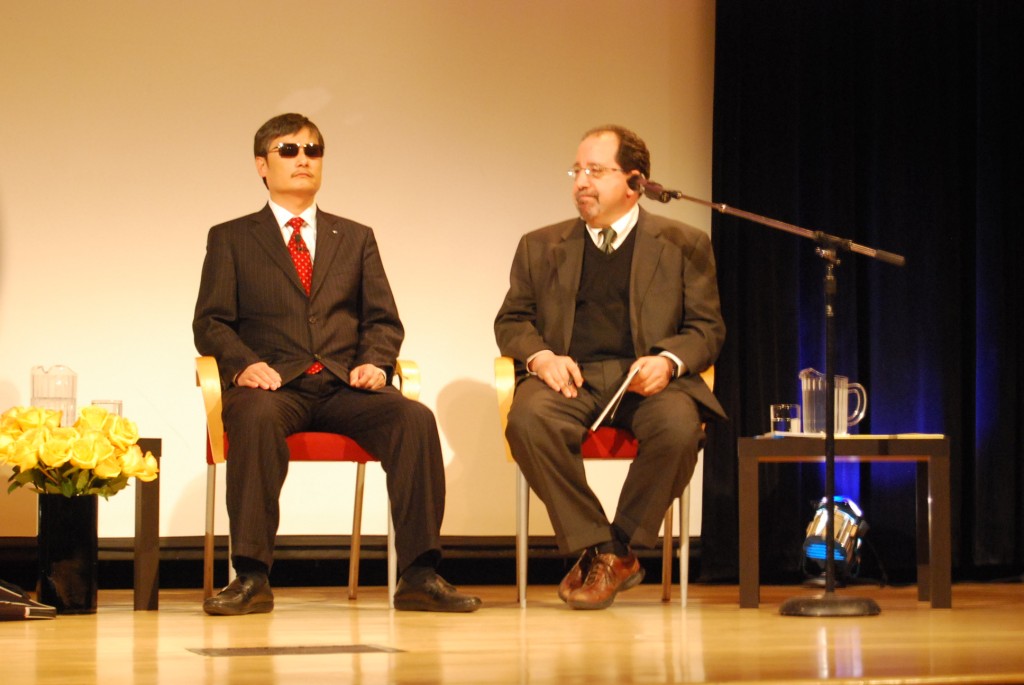
The Center for Public Scholarship held its fourth annual University in Exile event earlier this month at The New School’s Tishman Auditorium. Chinese political activist Chen Guangcheng, now a visiting scholar at New York University, spoke to a packed auditorium about the future of human rights and law in China.
Chen, who previously spent four years and three months in prison on charges of disturbing public order, fled house arrest with his wife and two children and traveled to the United States in April 2012. The U.S. government and Jerome A. Cohen, co-director of the U.S.-Asia Law Institute at NYU School of Law, were instrumental in securing Chen’s release to the United States. Cohen joined Chen on stage at Tishman and moderated the discussion.
Kurt M. Campell, U.S assistant secretary of state for Eastern and Pacific Affairs, negotiated with the Chinese government for his release from house arrest and to allow him to finish his education at a law school in China. Chen, however, decided to leave China due to government threats against his family. The Chinese Government, which previously forbade him from leaving the country, allowed him to apply for a visa to study abroad. That same day, New York University offered Chen a visiting scholar position.
At the discussion, Chen told the audience that the Chinese government must be held accountable to its own laws and values.
“The Chinese government is not following the laws they have in their own books,” Chen said. “There’s an old Chinese saying that goes: If you are doing it right, why are you afraid of people criticizing you?”
Chen, blind from an early age, grew up a farm boy and learned about politics and law from his father. He later studied medicine and became a self-taught defense lawyer in his village of Dongshigu. At first he was defending people with disabilities, who were unlawfully forced to work, but he soon started to fight for the rights of women and farmers.
Journalists often describe Chen as a dissident, though Chen himself does not necessarily use that title. Instead, he said that he works within the legal system and calls China to account using its own laws.
“The majority of good laws are rarely being enforced, while the bad ones are regularly used,” Chen said.
Chen pointed to the case of his nephew, activist Chen Kegui, whom the Chinese government jailed in retaliation for Chen’s escape. Government-sponsored guards broke into Kegui’s home and beat him, according to Chen. When he sued them, the court instead found Kegui guilty. Chen considered the trial to be unfair. Police denied journalists, and even Chen’s own parents, from entering the public trial.
Chinese law specifically states that a person convicted to stand trial is allowed to choose their own lawyers, but the courts and its leaders could not follow through.
“If the party’s secretary can’t obey the law then explain how other people can?” asked Chen.
Chen has a lot of thoughts on how the Chinese government system can learn from its western contemporaries. He believes that cooperation between the United States and China is important. However, he thinks the U.S. government should further push for human rights in China.
“More communication between the U.S. and China is essential, if business corporations [would] partner up more, America’s ideas for human rights [could] more easily influence the Chinese government in a positive way.”
He does not necessarily believe China needs another revolution, but that one might be necessary if the government is not willing to reform and apply its own rule of law.
Kevin Slaten from China Labor Watch, a New York based NGO that helps to defend workers’ rights in China, said that Chen’s talk was “very enlightening.”
Julie Zhai, a Milano graduate student, felt that her presence was needed to show support for her fellow countryman. She had been following Chen’s case for a long time, and was curious about his stance on human rights.
“Is it doomed or there is hope ahead?” Zhai asked. She felt that while human rights in China has seen an improvement in recent years, there is still a long way ahead.
Despite Chen’s current employment as a visiting scholar at NYU, he does not know where his future lies. He said that he will continue to educate the public about human rights in China.
He further stressed that freedom of speech and a just and fair society are essential to the wellbeing of a country’s government and residents. He says that the issues and concerns he has addressed and brought to people’s attention are only the tip of the iceberg.







Leave a Reply